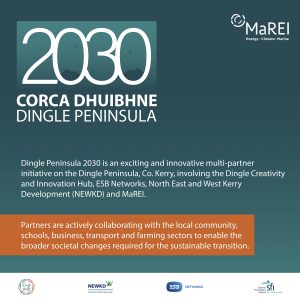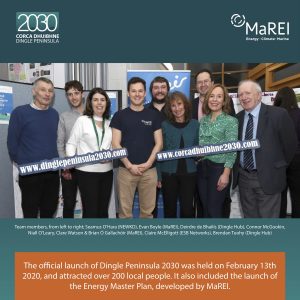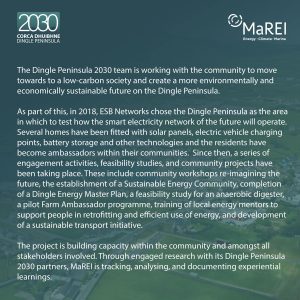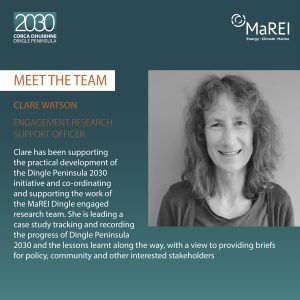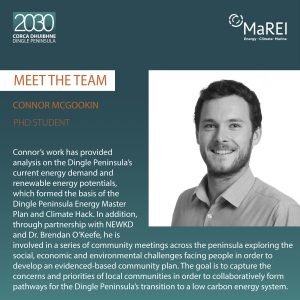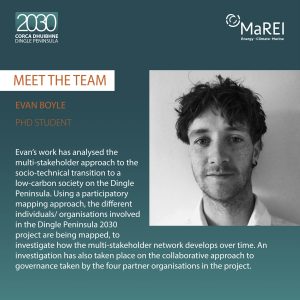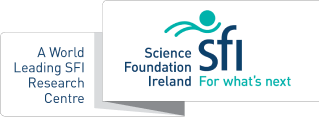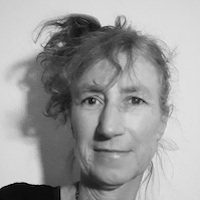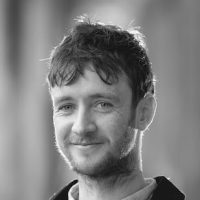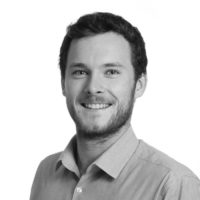
Dingle Peninsula 2030
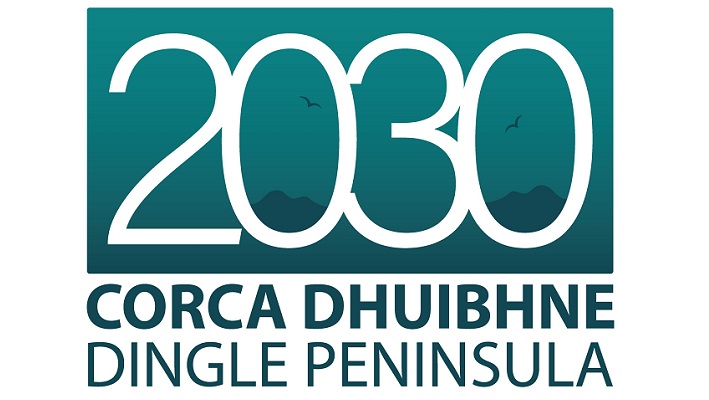
- Title
-
Corca Dhuibhne 2030/ Dingle Peninsula 2030
- Start Year
-
Jan 2018
- End Year
-
Dec 2023
- Research partner/host
-
MaREI Centre, Environmental Research Institute, UCC, Ireland
- Project Partners
-
Dingle Creativity and Innovation Hub (Mol Teic), North East & West Kerry Development (NEWKD) and ESB Networks
- Funding Bodies
-
Science Foundation Ireland, ESB Networks, US-Ireland Partnership Programme
- Principal Investigators
-
2018-2021
Prof Brian Ó Gallachóir, School of Engineering – Energy Engineering, University College Cork, Ireland
Prof Edmond Byrne, School of Engineering – Process & Chemical Engineering, University College Cork, Ireland
Dr Gerard Mullally, Department of Sociology, University College Cork, Ireland
2021-2022
Prof Brian Ó Gallachóir, School of Engineering, University College Cork, Ireland
- Research Area
-
Climate Change, Community Engagement, Societal Transitions, Energy System Analysis
- Website
Introduction
Established in 2018, Dingle Peninsula 2030 is an exciting and innovative multi-partner initiative on the Dingle Peninsula, Co. Kerry, involving the Dingle Creativity and Innovation Hub, ESB Networks, North East and West Kerry Development (NEWKD), and MaREI. The premise is based on the Quadruple Helix Model involving science, policy, industry, and society. Partners are actively collaborating with the local community, schools, business, transport, and farming sectors to enable the broader societal changes required for the sustainable transition.
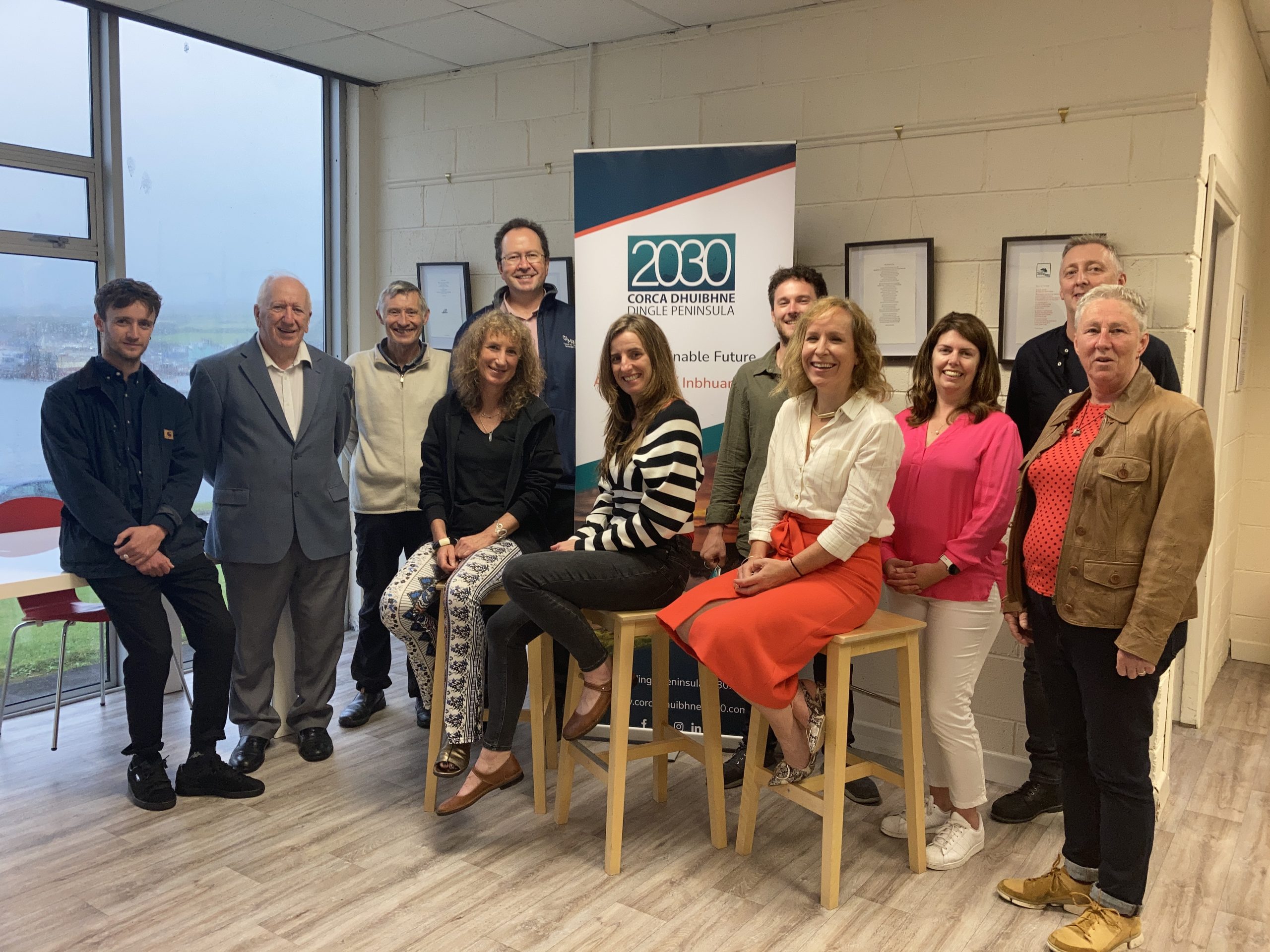
Team members, from left to right; Seamus O’Hara (NEWKD), Evan Boyle (MaREI), Deirdre de Bhailís (Dingle Hub), Connor McGookin, Niall O’Leary, Clare Watson & Brian Ó Gallachóir (MaREI), Claire McElligott (ESB Networks), Brendan Tuohy (Dingle Hub)
Over the past two years, this work has included:
- Establishing the Dingle Sustainable Energy Community
- Developing the Dingle Peninsula Energy Master Plan
- Trials with 5 Ambassadors and local participants involving PV panel, battery management system, heat pump, and electric car technologies (beginning in Sept 2020), run by ESB Networks as part of The Dingle Project
- Developing an education and outreach programme and website
- Piloting a ‘Climate Hack’ in local secondary schools, to encourage students to make informed decisions about the future energy system
- Completing a feasibility study for an anaerobic digester
- Initiating a pilot Farm Ambassador Programme, to increase agricultural sustainability and productivity
- Training ten local energy mentors to support people in retrofitting and efficient use of energy
- Supporting the emergence of a community energy co-operative
- Delivering community meetings on the Peninsula, to develop a plan for a sustainable future
- Development of a sustainable transport initiative
- Mutual learning with other groups in the area, including Transition Kerry, and SEAI Community Mentors
Through engaged research with its Dingle Peninsula 2030 partners, MaREI is tracking, analysing, and documenting experiential learnings.
Awards and Recognition
- Recognition by the United Nations as a UN Living Laboratory – Learn more.
- IPB PRIDE OF PLACE AWARDS 2021 – Climate Action Award
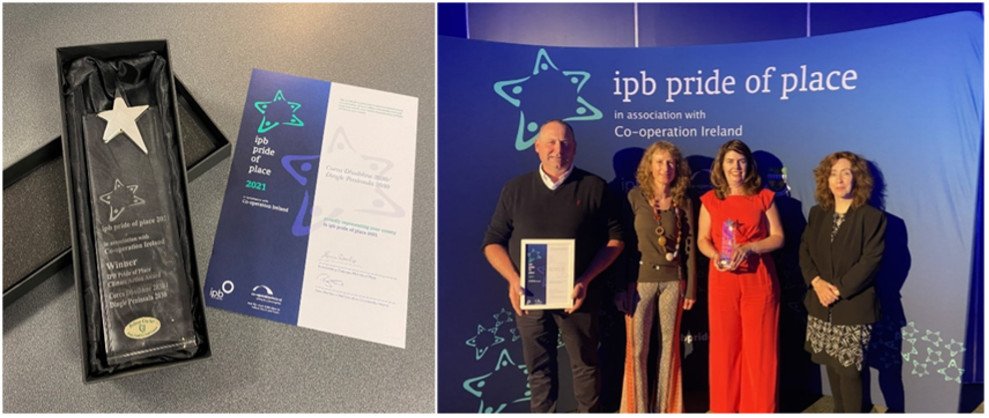
- UCC Research Awards 2021 – Engaged Research of the Year
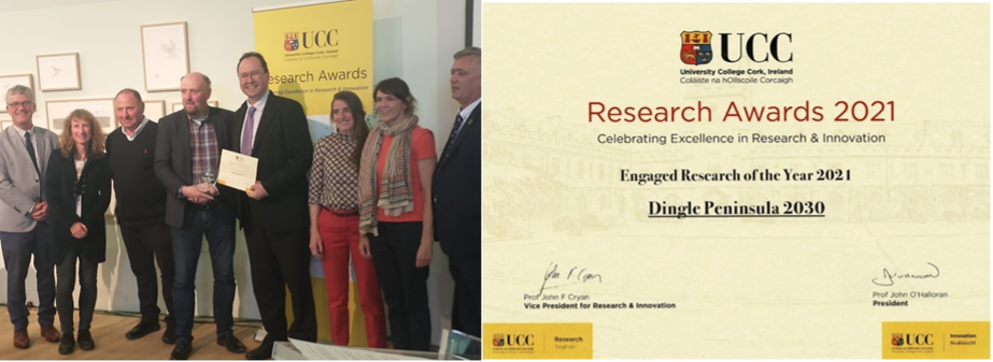
- SEAI Energy Awards 2021 – Inspirational Energy Community
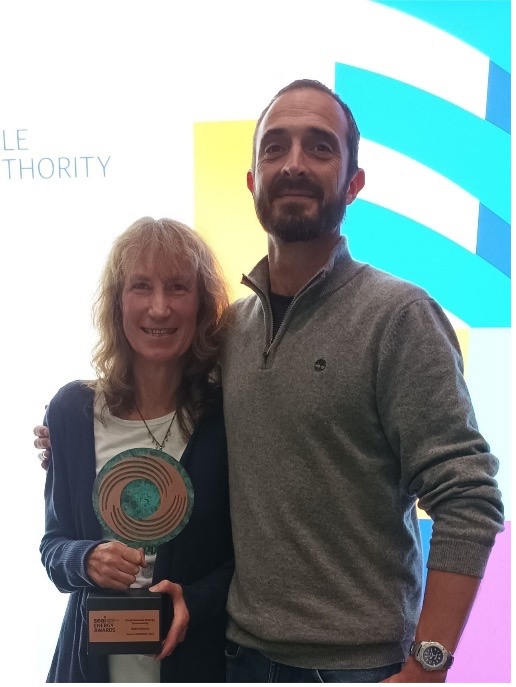
- Science Foundation Ireland 2022 Awards – ‘SFI Engaged Research of the Year Award 2022’
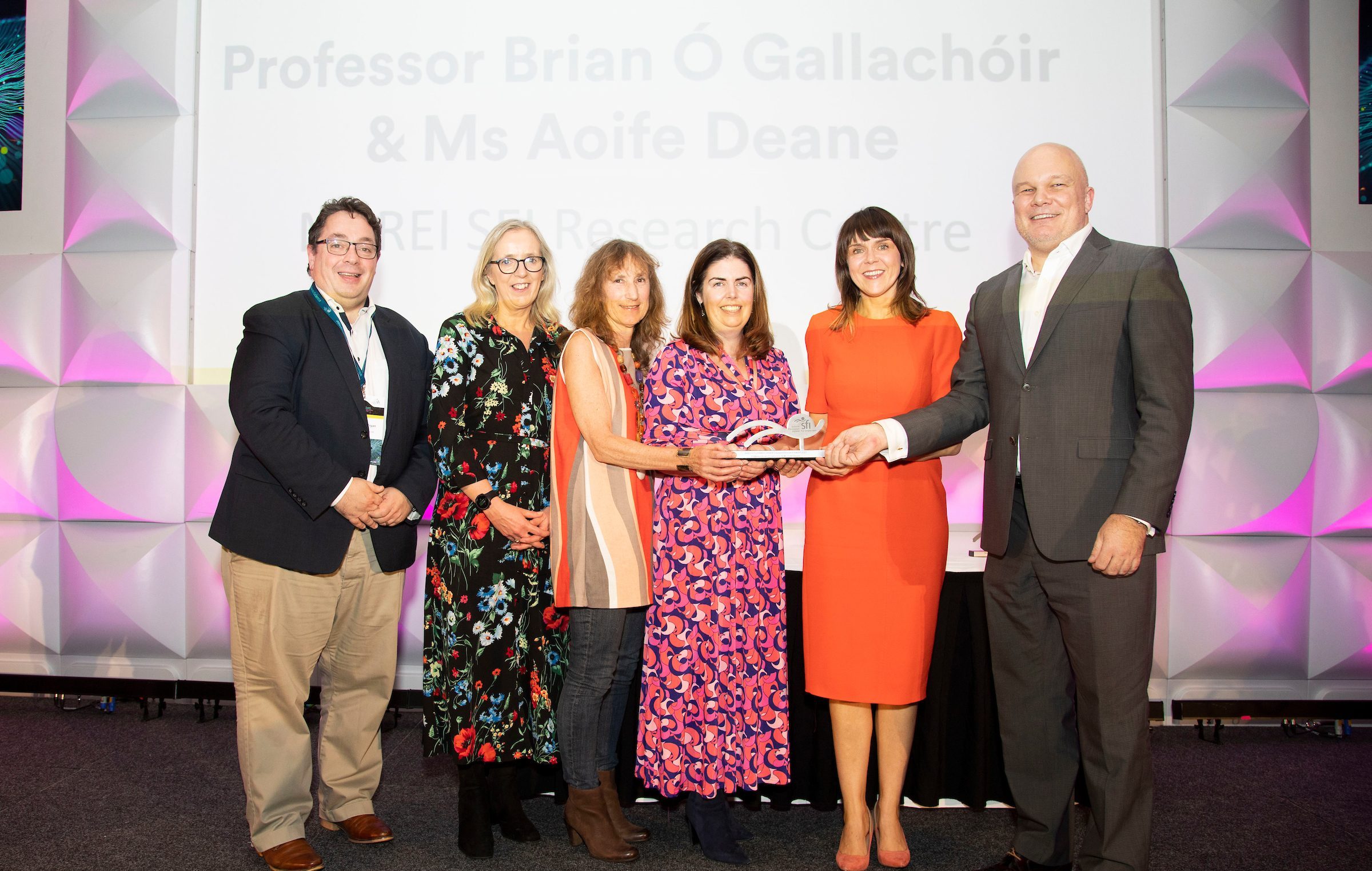
Work Packages
Phase 1: 2018- 2021
WP1; Dingle Peninsula 2030 Case Study and Community Engagement Support
Clare Watson, Engagement Research Support Officer
To date, Clare has been supporting the practical development of the Dingle Peninsula 2030 initiative and coordinating and supporting the work of the MaREI Dingle engaged research team. She is leading a case study tracking and recording the progress of Dingle Peninsula 2030 and the lessons learned along the way, with a view to providing briefs for policy, community, and other interested stakeholders
Objectives:
- provide practical support and advice where necessary
- assist in the setting up and development of effective engagement processes, project structures, and communication channels between stakeholders, and between stakeholders and the wider Dingle population.
- help develop mutually beneficial networks between the Dingle projects and other experienced people and groups outside of the area
- document the development of Dingle Peninsula 2030
- identify and evaluate what worked and didn’t work, the successes, challenges, and barriers
- provide learning for the future roll-out of the ESB Networks Smart Grid
- provide learning for policymakers, state agencies, and other community-based groups
WP2; Scenario analysis exploring potential futures for the Dingle peninsula’s energy system
Connor McGookin, PhD Student
To date, Connor’s work has provided analysis on the Dingle Peninsula’s current energy demand and renewable energy potentials, which formed the basis of the Dingle Peninsula Energy Master Plan and Climate Hack. In addition, through a partnership with NEWKD and Dr. Brendan O’Keefe, he is involved in a series of community meetings across the peninsula exploring the social, economic, and environmental challenges facing people in order to develop an evidence-based community plan. The goal is to capture the concerns and priorities of local communities in order to collaboratively form pathways for the Dingle Peninsula’s transition to a low carbon energy system. These elements of the project are funded by the US-Ireland R&D Partnership Programme as part of the CREDENCE project
Objectives:
- collaborate with members of the public and organisations across the peninsula to capture the broad range of opinions/perspectives
- collaborate with existing initiatives on the peninsula (i.e. Dingle Sustainable Energy Community, ESB Networks, etc.)
- understand the potential futures for the peninsula and the energy system that these futures are likely to produce
- empower locals to become part of the energy transition by providing insights into the energy system
WP3; Multi-stakeholder approach to the socio-technical transition to a low-carbon society on the Dingle Peninsula
Evan Boyle, PhD Student
To date, Evan’s work has analysed the multi-stakeholder approach to the socio-technical transition to a low-carbon society on the Dingle Peninsula. Using a participatory mapping approach, the different individuals/ organisations involved in the Dingle Peninsula 2030 project are being mapped, to investigate how the multi-stakeholder network develops over time. An investigation has also taken place on the collaborative approach to governance taken by the four partner organisations in the project. The ESBN Ambassador project is being analysed to understand the dynamics required to activate the energy citizen in Ireland in light of the Dingle Peninsula 2030 project. Alongside this, at a national level, this research is working alongside a range of public bodies, including ESBN, to investigate current good practice for community engagement.
Objectives:
- facilitation of a participatory mapping exercise with a number of key stakeholders related to the range of initiatives on the peninsula.
- work with ESBN ambassadors to assess the integration of new technologies into their lifestyles to attain lessons for future deployment.
- conduct regular interviews with a wide range of actors involved in Dingle 2030 to evaluative and analyse this innovative approach to the socio-technical transition to a low-carbon society in a regional context.
- Facilitation of a workshop on community engagement within public bodies with a number of national organisations.
Phase 2: 2021- 2022
WP 2.1 Dingle Peninsula 2030- A Model Enabling Community-led Climate Action
This project is supporting and enabling Dingle Peninsula 2030 to develop further, focusing on support for implementation of projects and community engagement. It is also enabling research and evaluation of the collaborative engagement processes and shared learnings to inform both policy and practice nationally.
Project Aims
- Strengthen legacy structures in Dingle Peninsula 2030 to ensure continued impact beyond the lifecycle of seed funding.
- Share learning nationally with other communities and stakeholders via multimedia outputs and networking events.
- Develop good practice toolkits on engaged research, co-creation processes, and innovative engagement methods in STEM .
Project Team
Aoife Deane, Communications and Public Engagement Manager
Aoife is project lead on the SFI Discover funded project ‘A Model Enabling Community-led Climate Action’. She works with the team to support community engagement on initiatives, to document and share learnings with stakeholders, and to develop resources on engaged research.
Dr Clare Watson, Engagement Research Support Officer
Clare is leading a process of reflective learning which will culminate in a series of learning briefs. She is also providing practical support and guidance to the Dingle Peninsula 2030 team.
Emma is providing support with a number of aspects of the project, including project management within MaREI as well as working with project partners on delivering the engaged research elements of the work.
This project is funded by the Science Foundation Ireland Discover Programme
WP 2.2 Corca Dhuibhne Inbhuanaithe 2030 – A Creative Imagining
This project involves an embedded artist engaging creatively with the wider farming community on the Dingle Peninsula and supporting ten participating farmers to identify climate action solutions that will work for them and wider society.
Project Aims
- To bring about an attitudinal change and shift in values within the farming community on the Dingle Peninsula with regard to the role that agricultural emissions play in Ireland’s carbon footprint.
- To support the farming community in transitioning to less carbon intensive methods including approaches that will sequester carbon and support biodiversity.
- Combining practical and creative approaches, to create an understanding in the wider community about the challenges that farmers face, thus creating a more supportive environment in which farmers can diversify.
Dr Clare Watson, Engagement Research Support Officer
As an active member of the project team, Clare is leading a process of reflective learning, evaluation and documentation with the key participants (farmers, artist, and steering group) throughout the project. As well as contributing to on-going assessment and learning, this work will also inform decision-making throughout. At the end of the project, a learning brief will be co-produced with the farmers and project team.
This project is funded by Creative Ireland.
Publications & Outputs
Videos
Corca Dhuibhne public vox pops
Engaged Research on the Dingle Peninsula
Sustainable Agriculture on Dingle Peninsula (full version)
Energy Action on the Dingle Peninsula (full version)
Dingle Peninsula Living Lab
Learning Briefs
WHAT IS A LEARNING BRIEF?
The Dingle Peninsula 2030 ‘Learning Briefs’ are short documents focusing on learnings from particular activities, projects or outcomes relating to the work of the partnership. The process is co-ordinated by MaREI but the learning briefs themselves are co-created with other members of the partnership.
Each learning brief endeavours to:
- provide context and background
- document what happened and how it happened
- explain the roles of the different participants
- demonstrate what worked, what didn’t work and how improvements might be made
- highlight the benefits, challenges and lessons learnt and how these might be diffused more widely, if relevant
- make recommendations
The overall aim is to capture the learnings in a format that is accessible and useful to the participants involved and to other communities, groups, researchers, companies, agencies and policy makers.
Learning briefs are produced relatively quickly and often during an ongoing process. This means that they are a way of collecting and presenting data in close to real-time.
The process of writing a learning brief involves intensive, collaborative reflection and deliberation. They therefore also provide a useful form of internal reflective learning and evaluation, which helps inform future decisions and actions and ultimately makes our work more effective.
Outputs
Regional energy transitions case studies
McGookin C., Ó Gallachóir B., Byrne E., O’Callaghan K. (2018)
| Dingle Peninsula 2030 Brochure | Dingle LED Bulb Swap Brief | Dingle Climate Hack | Energy Master Plan Learning Brief |
|---|---|---|---|
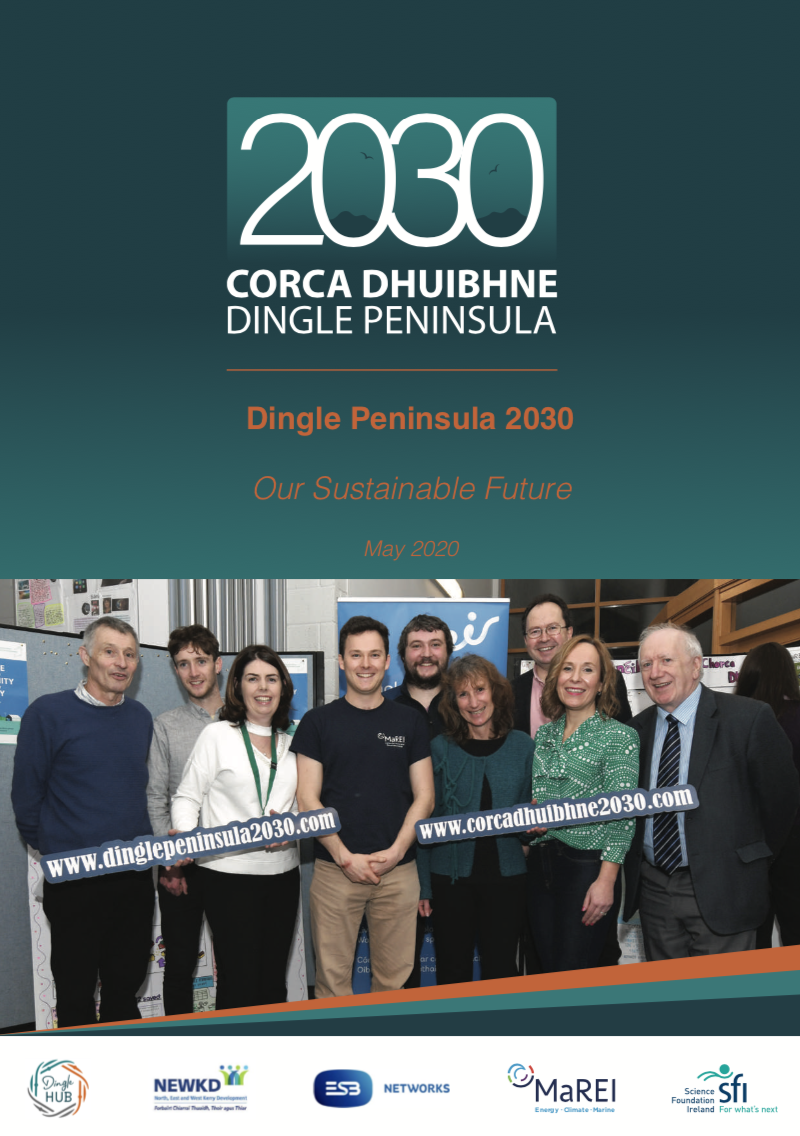 |
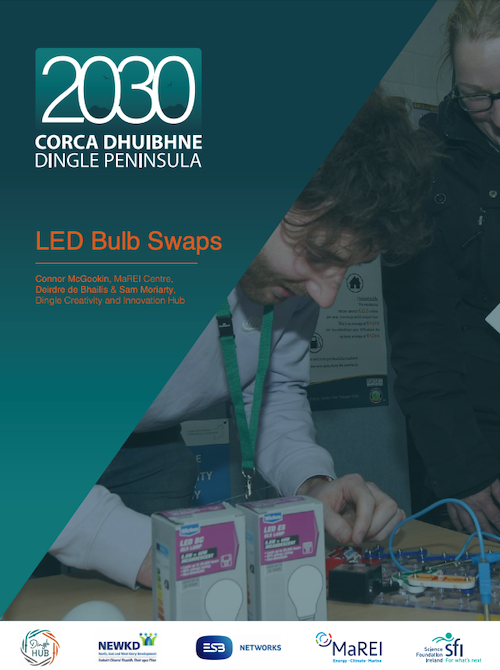 |
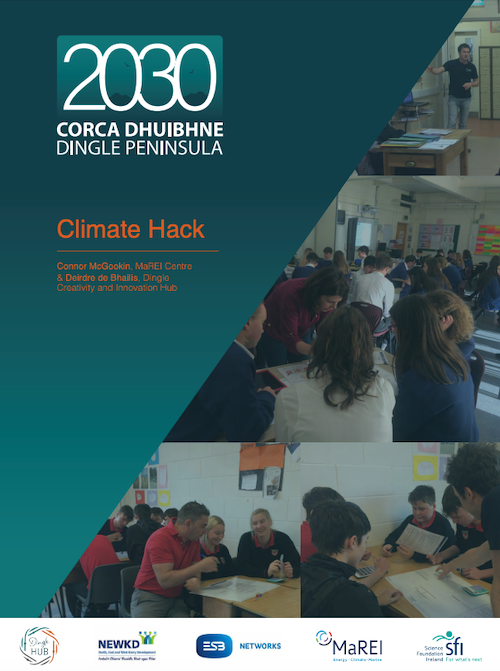 |
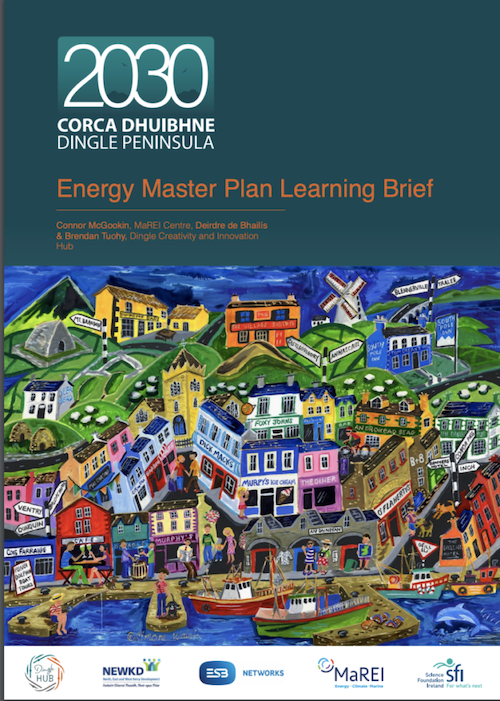 |
| The Value of Collaboration | Anaerobic Digestion on The Dingle Peninsula | The Community Energy Mentor Training Course |
Evidence-based Planning Corca Dhuibhne |
|---|---|---|---|
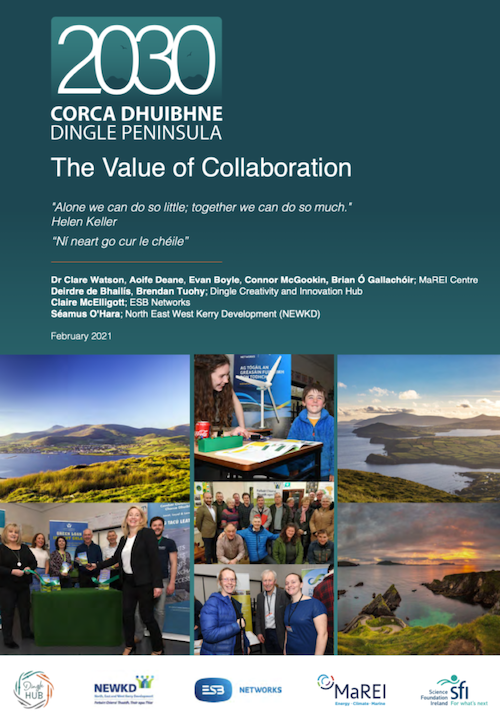 |
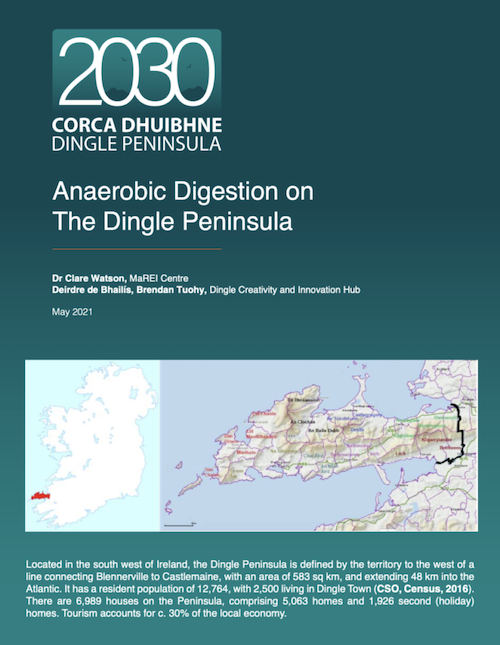 |
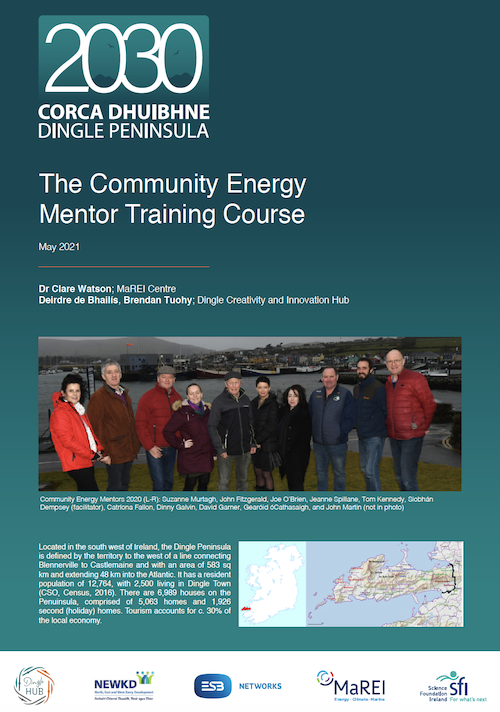 |
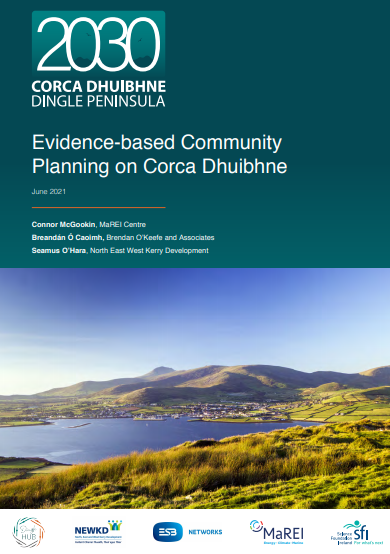 |
| Lessons Learnt and Recommendations for Policy and Practice | |||
|---|---|---|---|
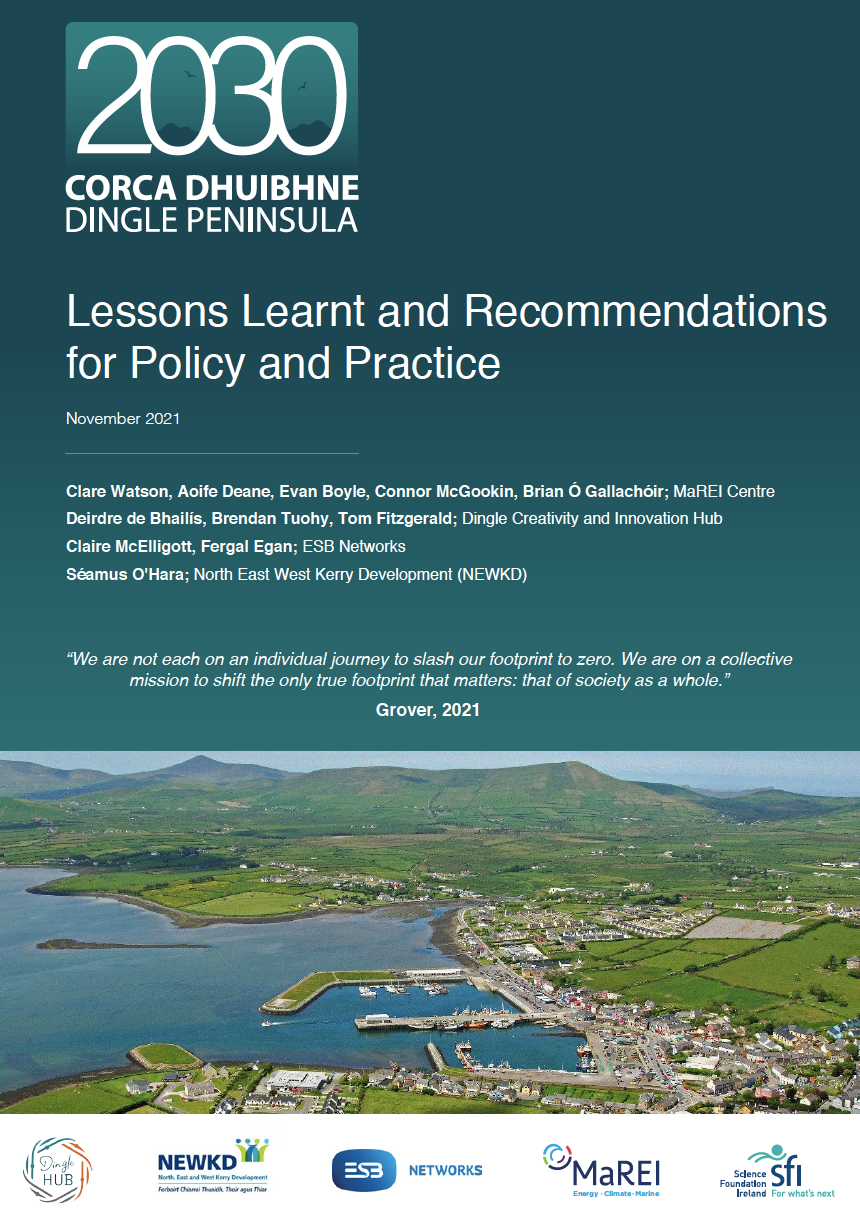 |
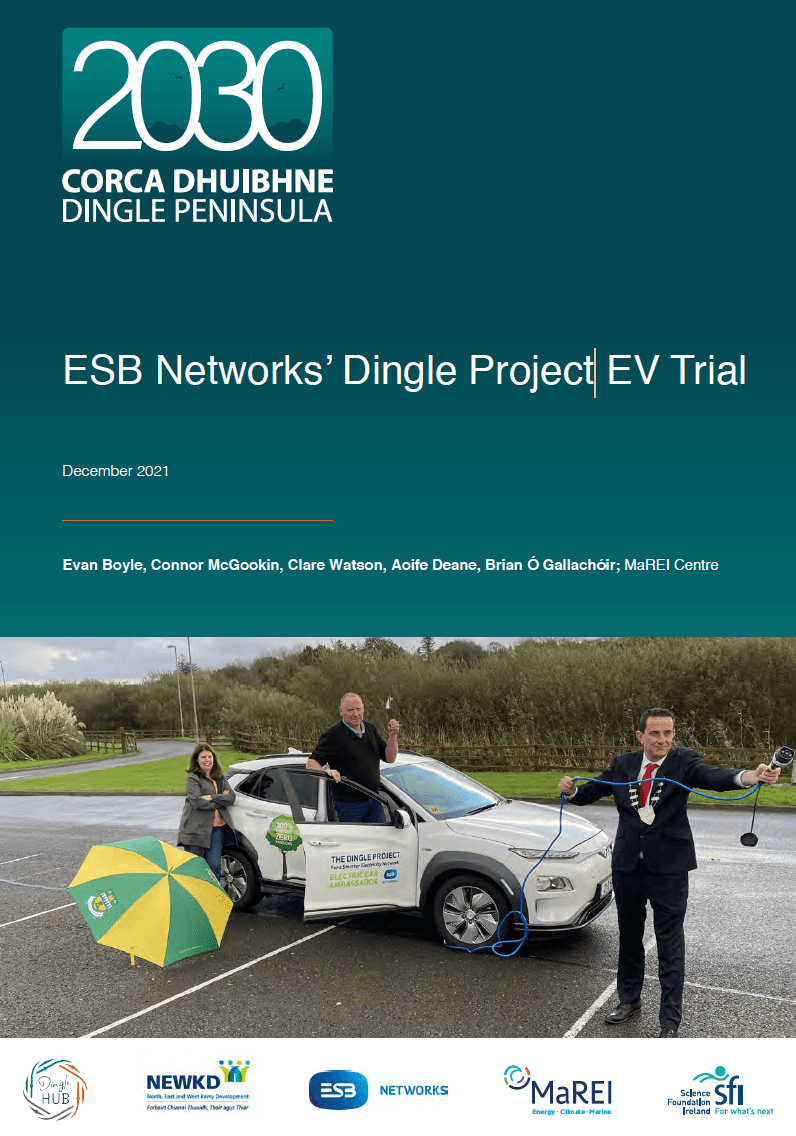 |
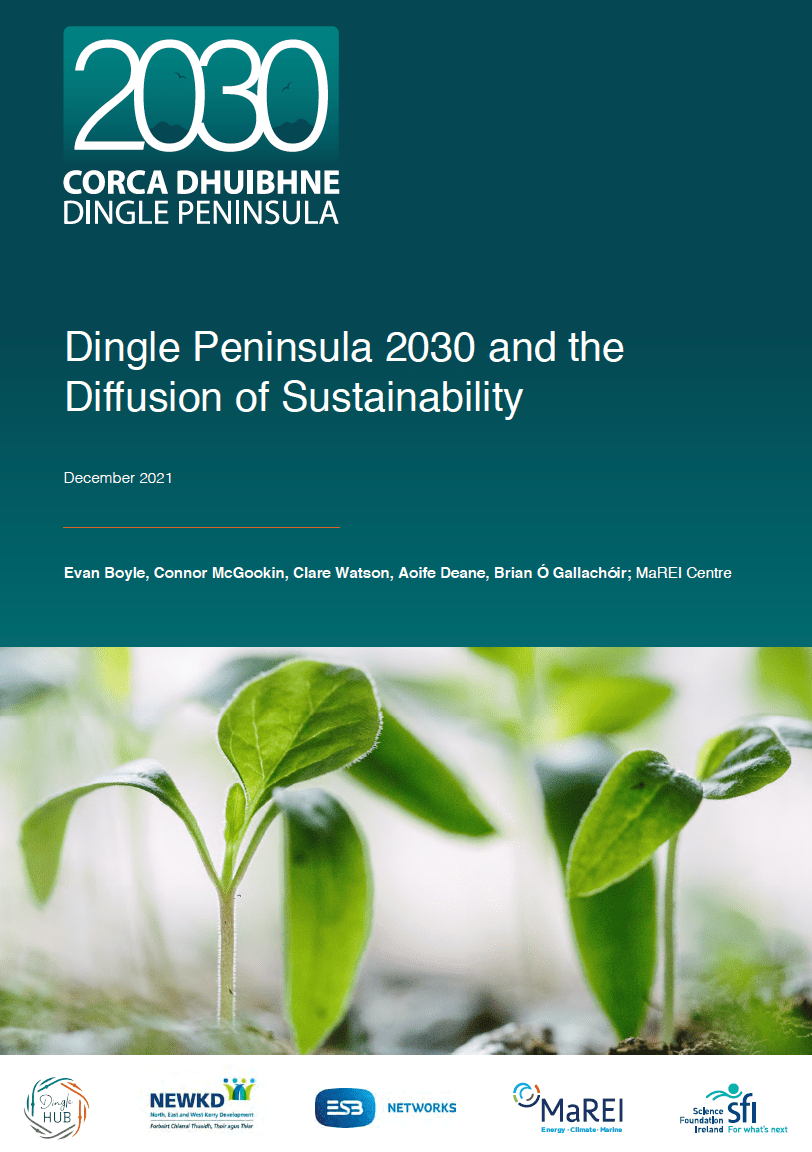 |
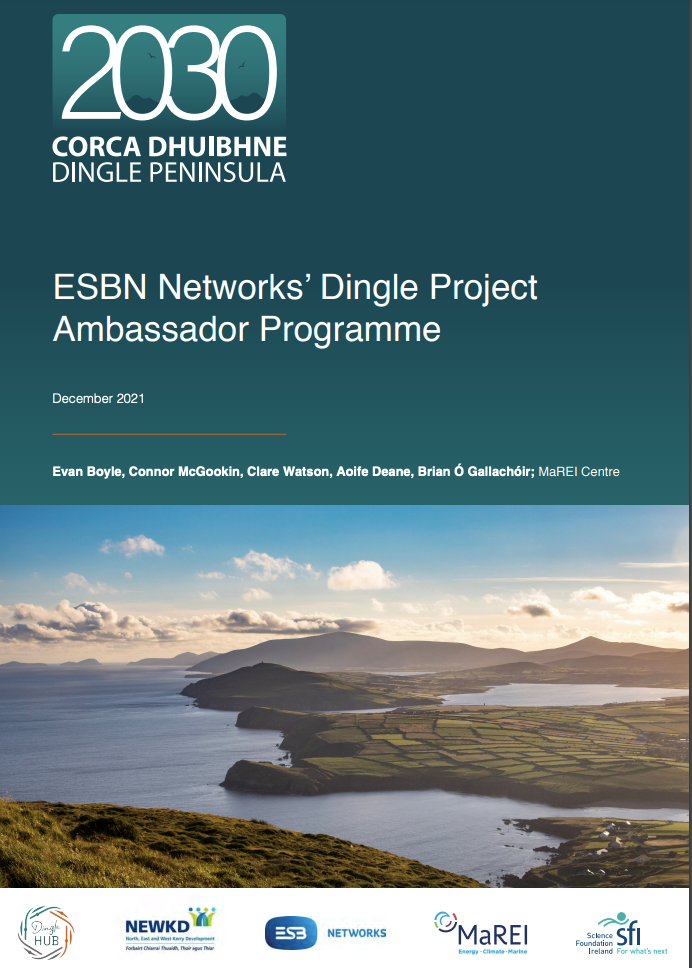 |
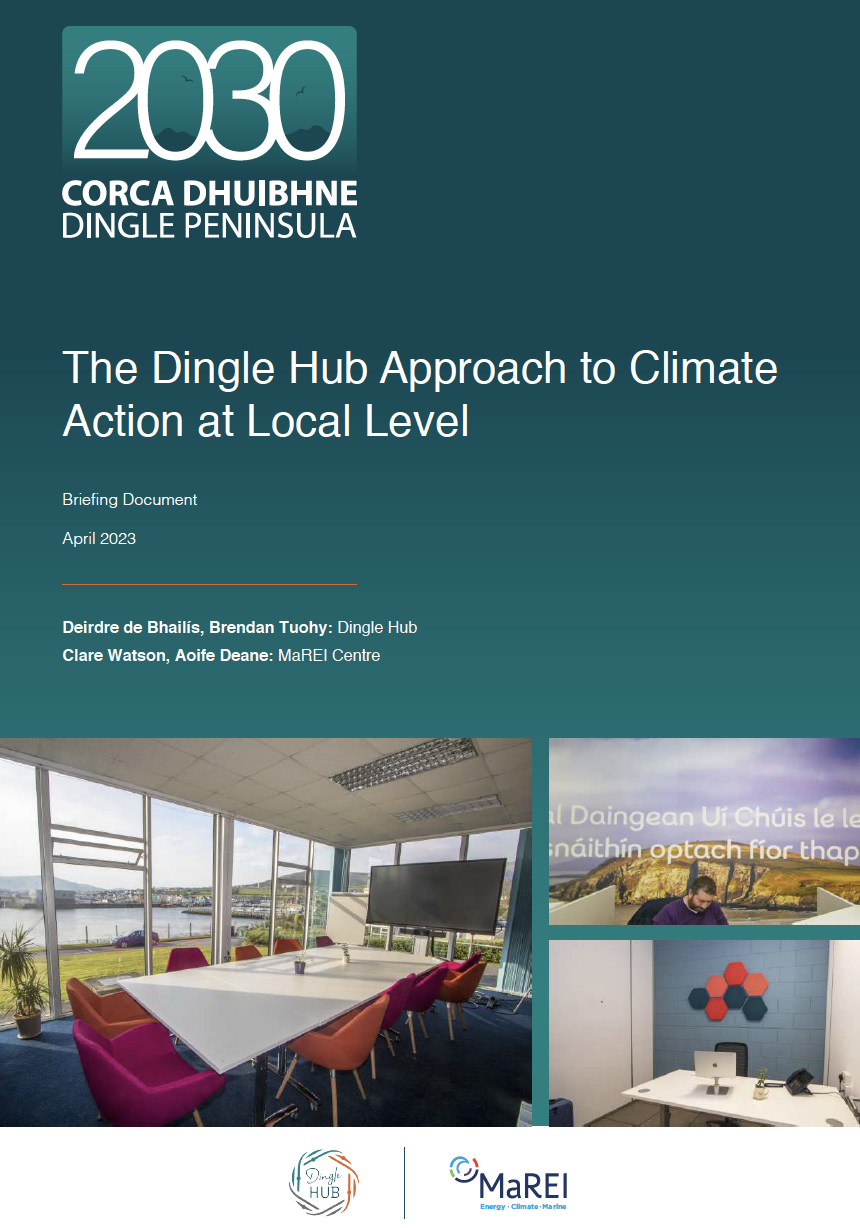 |
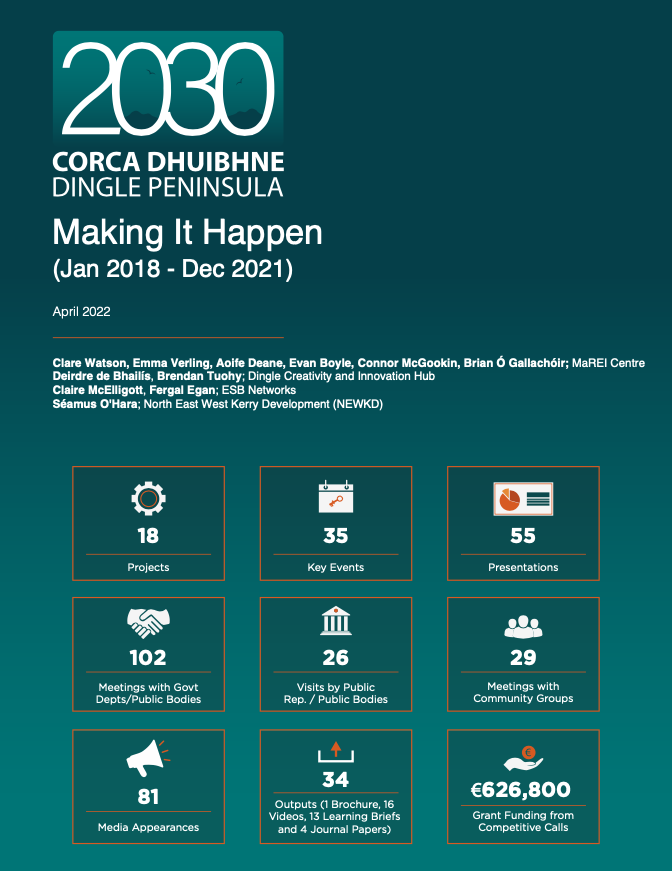 |
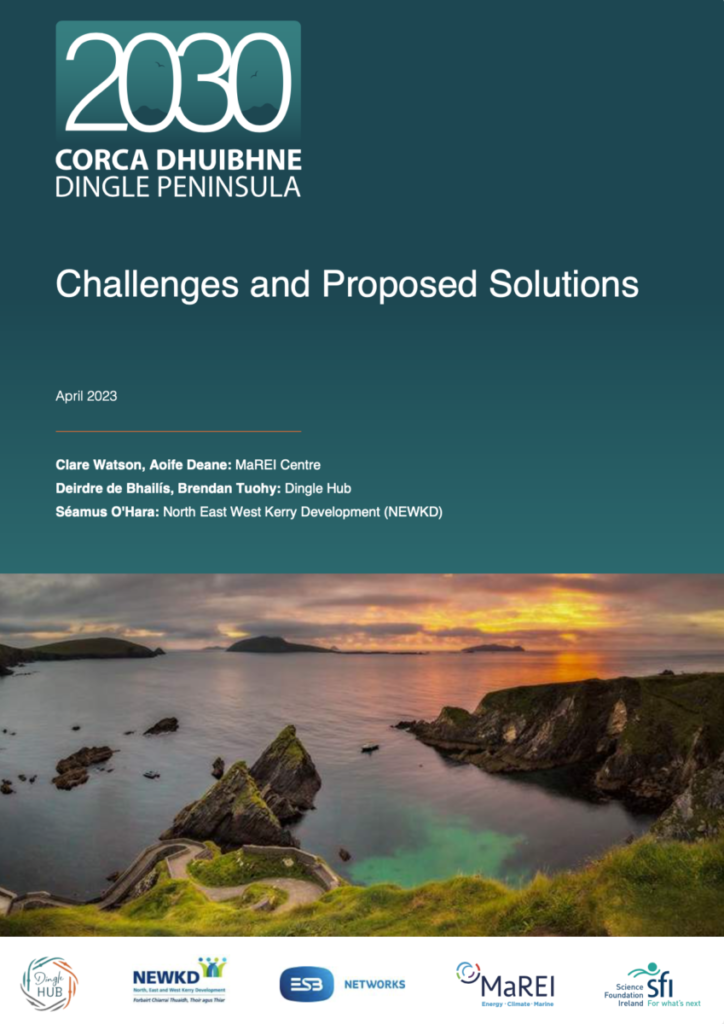 |
Dingle Peninsula 2030 Stakeholder Feedback Cards
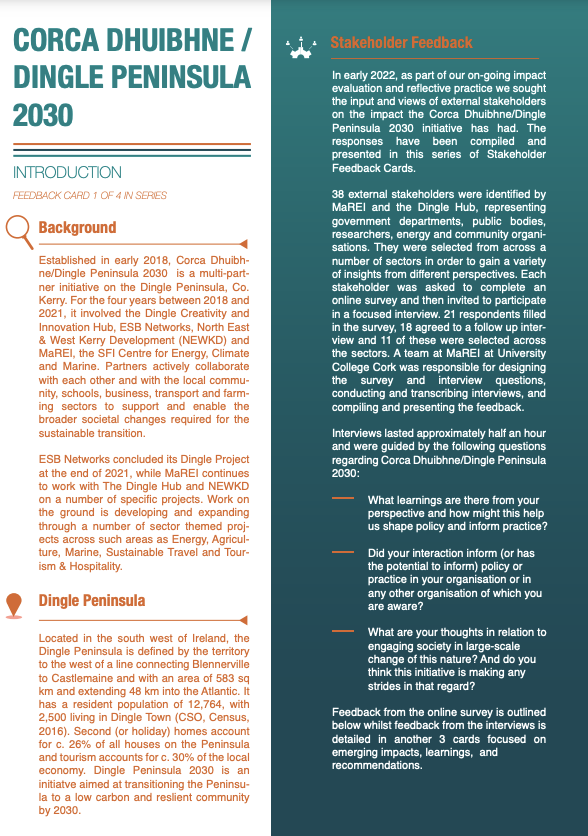 |
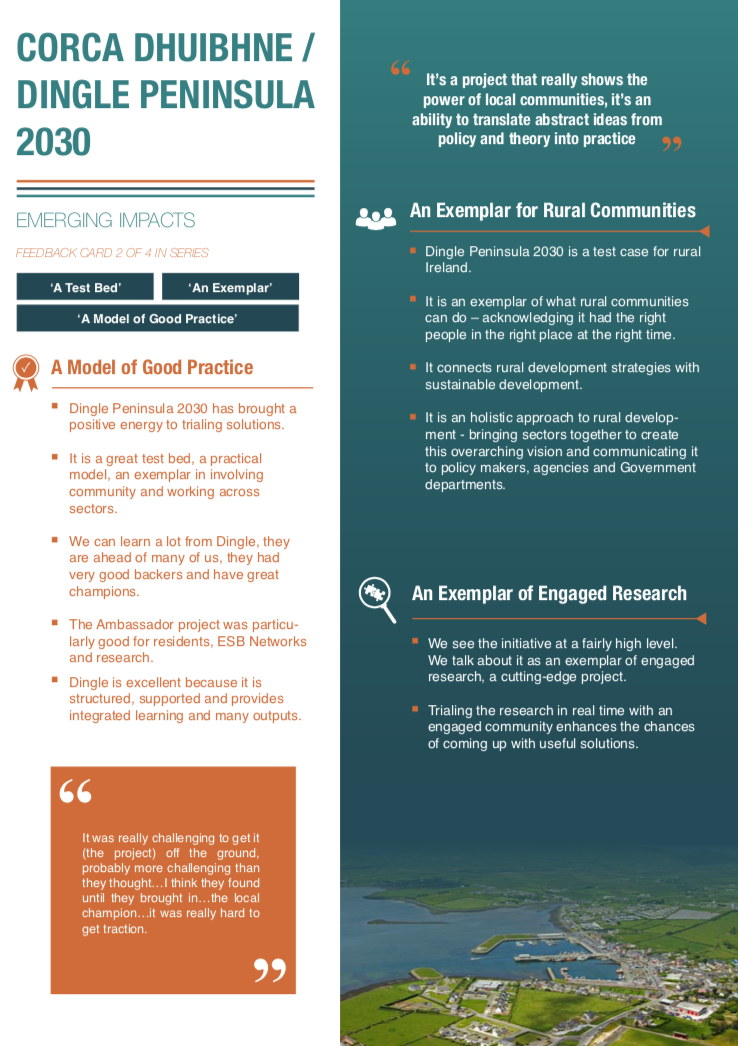 |
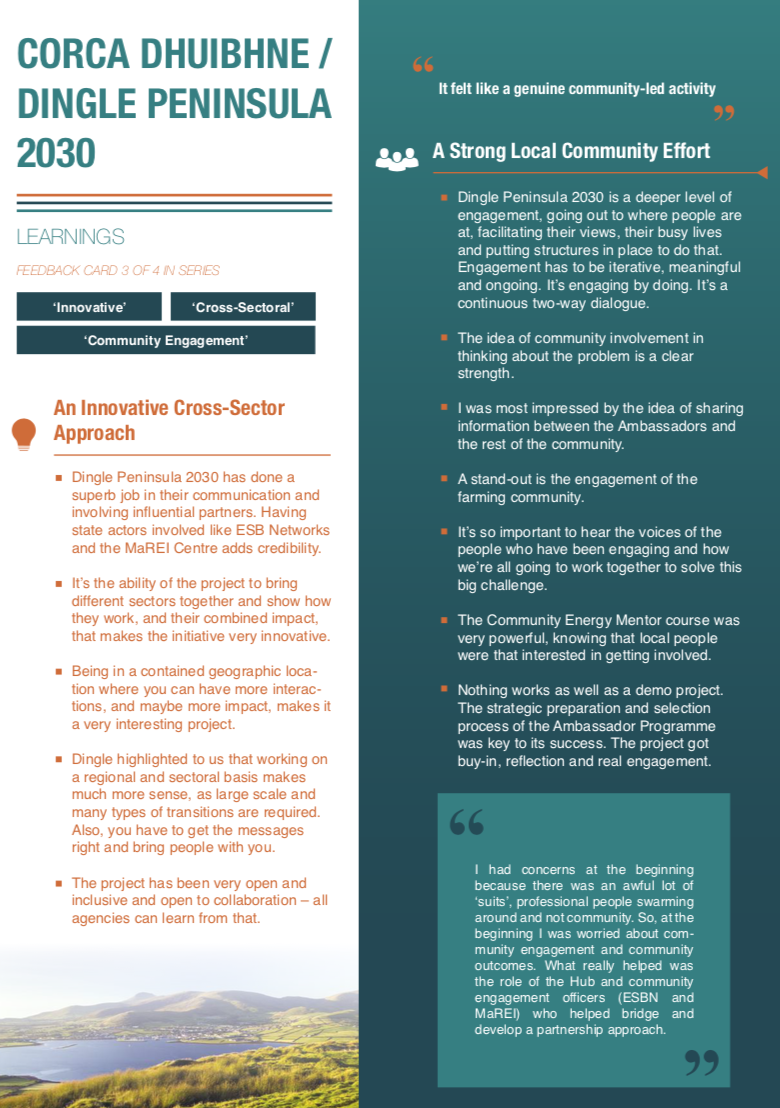 |
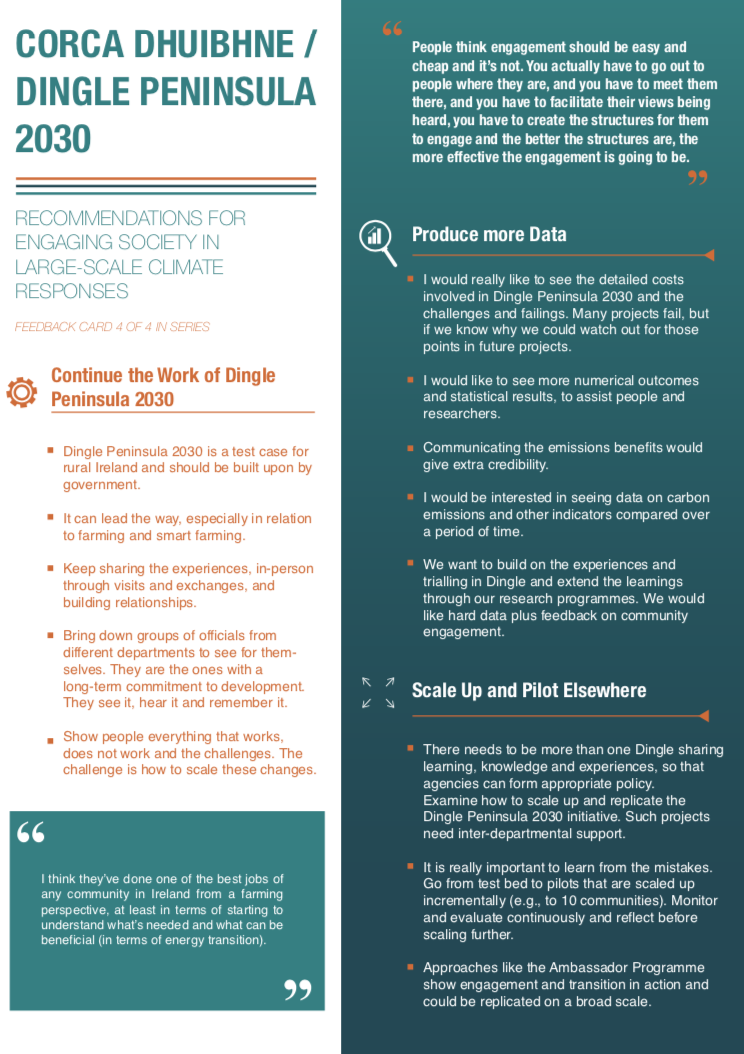 |
| STAKEHOLDER FEEDBACK CARD 1 – INTRODUCTION | STAKEHOLDER FEEDBACK CARD 2 – EMERGING IMPACTS | STAKEHOLDER FEEDBACK CARD 3 – LEARNINGS | STAKEHOLDER FEEDBACK CARD 4 – RECOMMENDATIONS |
Creative Climate Action Project – Learning Briefs
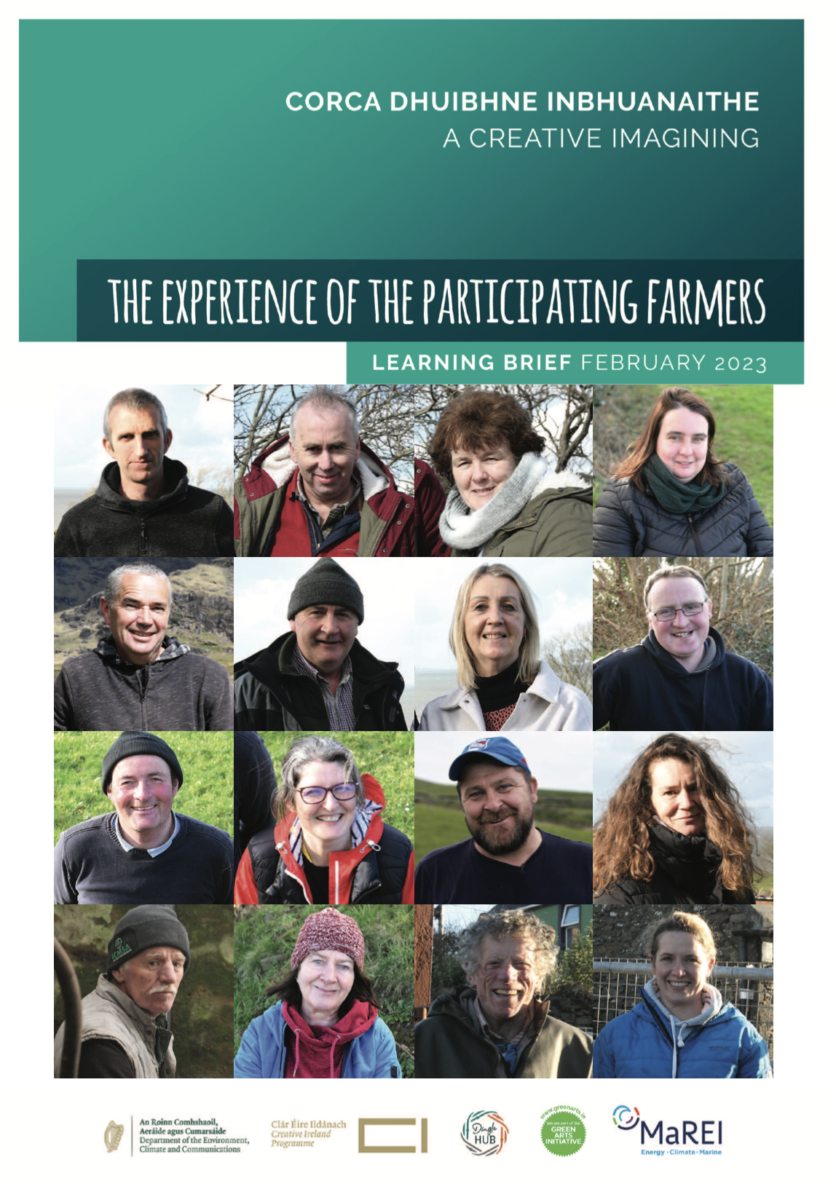 |
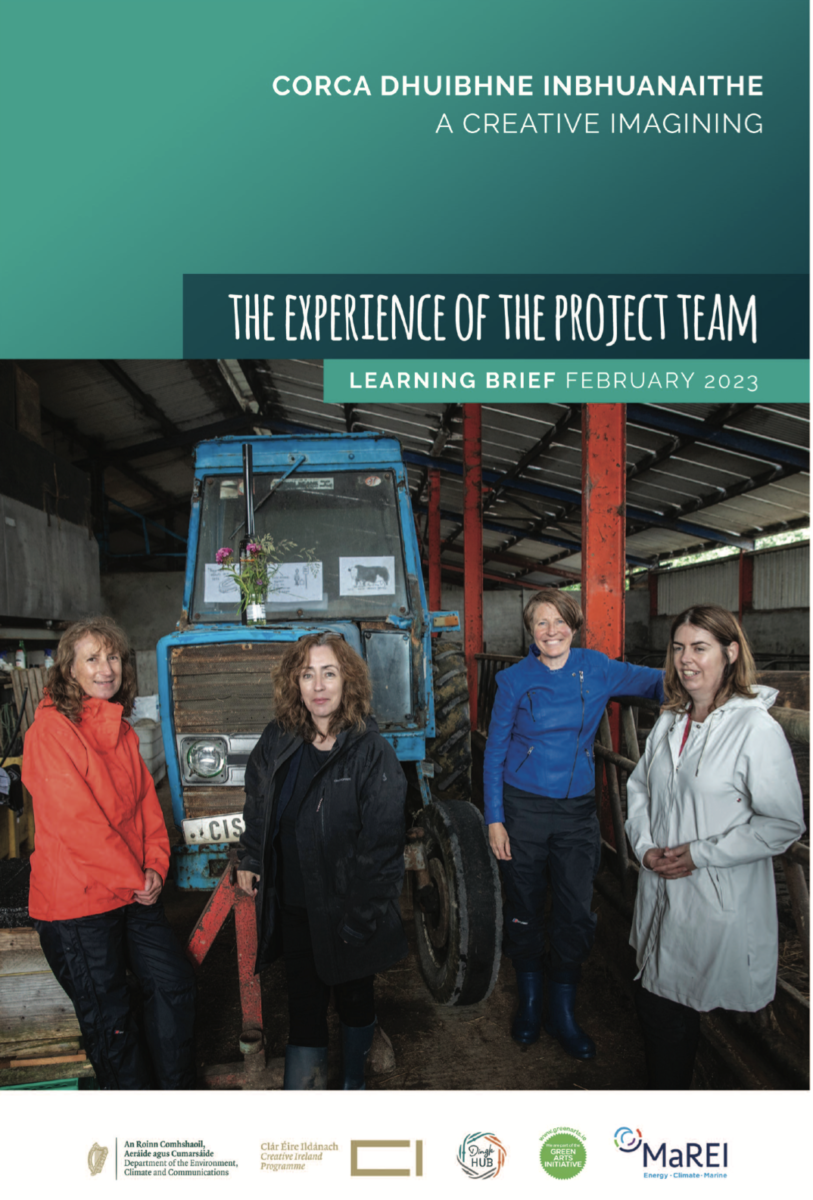 |
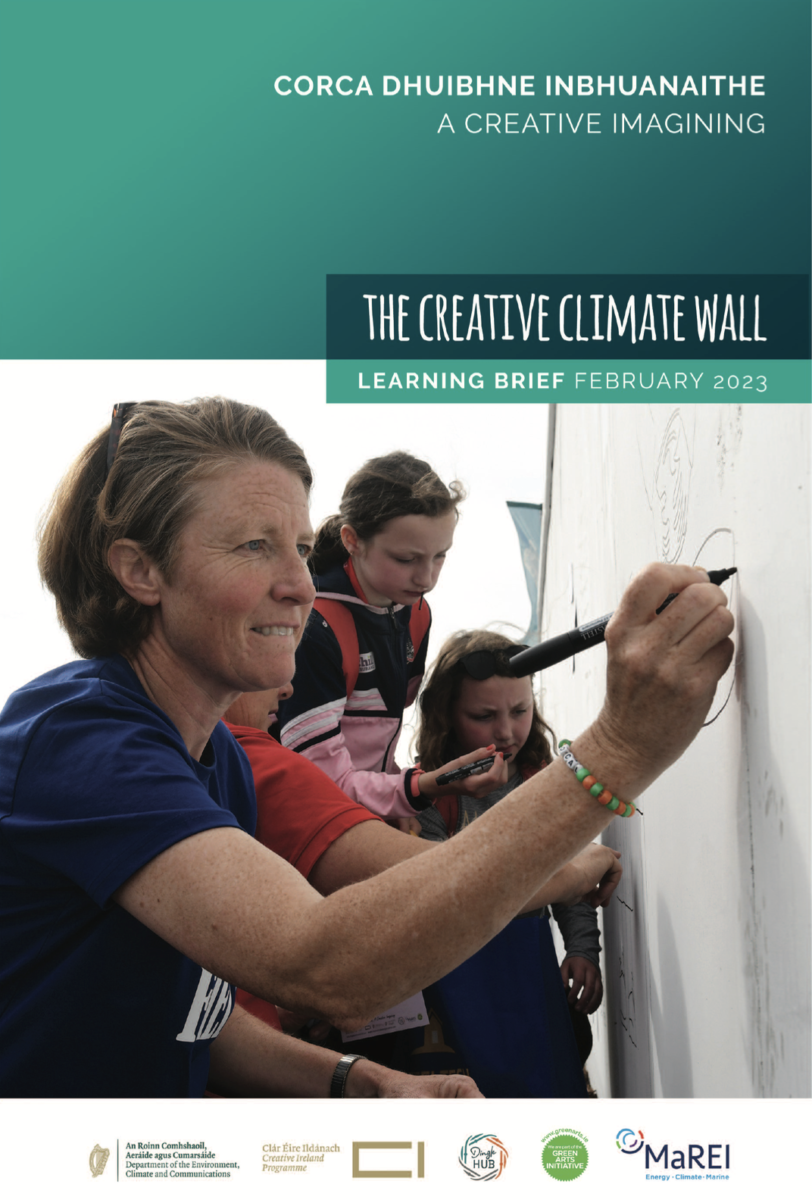 |
| The Experience of the Project Team |
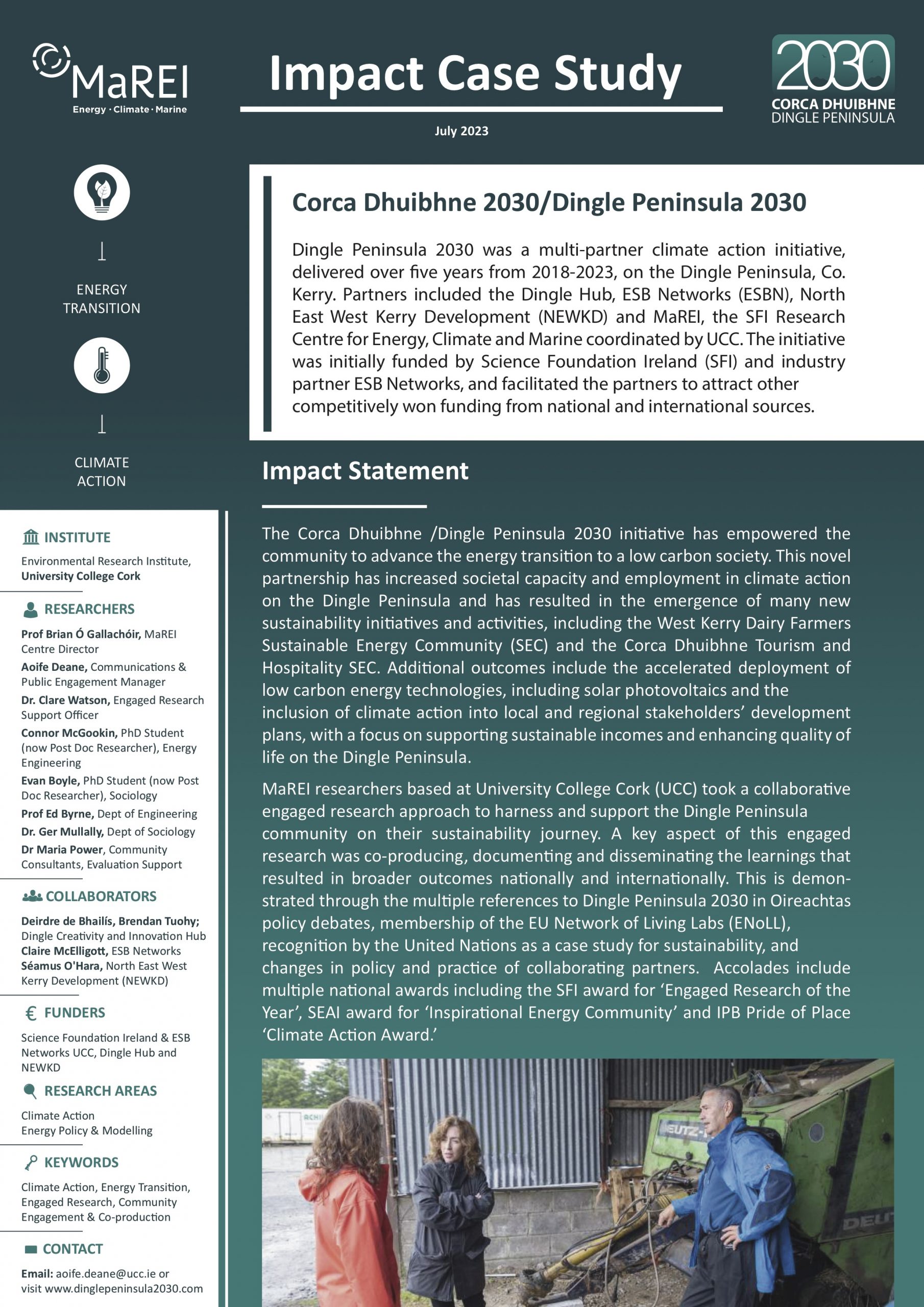 |
Academic publications & events
Conference presentations
- McGookin C., Ó Gallachóir B., Byrne E., (2019) ‘A transdisciplinary approach to energy system modelling; Case Study Dingle 2030’, 1st Energy and Environment Clustering Event. Durham University, 23-24 September 2019.
- Boyle E., Ó Gallachóir B., Mullally G., (2019) ‘Participatory Mapping on an Emergent Social Network for a regional transition to a low-carbon society’, Royal Geographical Society Annual Conference. RGS London, 27-30 August 2019
- Boyle E., Ó Gallachóir B., Mullally G., (2019) ‘A multi-stakeholder approach to a regional sustainability transitions’, International Political Anthropology Summer School. Acquapendente, Italy, 24-28 June 2019.
- McGookin C., Ó Gallachóir B., Byrne E., (2019) ‘Developing a regional energy balance; Case study from the Dingle peninsula’, Environ. IT Carlow, 18-20 April 2019.
- McGookin C., Ó Gallachóir B., Byrne E., (2018) ‘New Societal and Energy System Frameworks; Case Study Transition Dingle 2030’, International Sustainable Production and Consumption Conference. University of Manchester, 3-5 October 2018.
Academic Publications & Events
Conference presentations
- Bolger, P., McGookin, C., & Boyle, E. (2021) ‘Collaborating for a more sustainable society – Enabling team science and inter/transdisciplinary research for sustainability’, Environ. University College Cork, 16th – 18th June.
- McGookin, C., Ó Gallachóir, B., & Byrne, E. (2021). ‘Planning healthy communities for a healthy planet’, Environ. University College Cork, 16th – 18th June.
- McGookin, C., Ó Gallachóir, B., Byrne, E. (2021) ‘Walking the walk; meaningfully engaging people with engineering challenges’, EESD2021: Proceedings of the 10th Engineering Education for Sustainable Development Conference, ‘Building Flourishing Communities’, University College Cork, Ireland, 14-16 June. pp. 356-363. ISSN: 2737-7741 at: https://cora.ucc.ie/handle/10468/11459
- Boyle, E., McGookin, C., Glatz-Schmallegger, M., Ó Gallachóir, & Byrne, E. (2020) ‘Facilitating sustainability transitions through innovative governance’, IST2020 11th International Sustainability Transitions Conference. Austrian Institute of Technology and Vienna University of Economics and Business, 17th -21st August.
- McGookin C., Ó Gallachóir B., Byrne E., (2019) ‘A transdisciplinary approach to energy system modelling; Case Study Dingle 2030’, 1st Energy and Environment Clustering Event. Durham University, 23-24 September 2019.
- Boyle E., Ó Gallachóir B., Mullally G., (2019) ‘Participatory Mapping on an Emergent Social Network for a regional transition to a low-carbon society’, Royal Geographical Society Annual Conference. RGS London, 27-30 August 2019
- Boyle E., Ó Gallachóir B., Mullally G., (2019) ‘A multi-stakeholder approach to a regional sustainability transitions’, International Political Anthropology Summer School. Acquapendente, Italy, 24-28 June 2019.
- McGookin C., Ó Gallachóir B., Byrne E., (2019) ‘Developing a regional energy balance; Case study from the Dingle peninsula’, Environ. IT Carlow, 18-20 April 2019.
- McGookin C., Ó Gallachóir B., Byrne E., (2018) ‘New Societal and Energy System Frameworks; Case Study Transition Dingle 2030’, International Sustainable Production and Consumption Conference. University of Manchester, 3-5 October 2018.
Journal Papers
- McGookin, C., Ó Gallachóir, B., & Byrne, E. (2021). An innovative approach for estimating energy demand and supply to inform local energy transitions. Energy, 229, 120731.
- McGookin, C., Ó Gallachóir, B., & Byrne, E. (2021). A complied dataset of the energy usage indicators and unit energy consumption values available in Ireland. Data in Brief, 107204.
- McGookin, C., Ó Gallachóir, B., & Byrne, E. (2021). Participatory methods in energy system modelling and planning – a review. Renewable & Sustainable Energy Reviews, 151, 111504.
- Boyle, E., Watson, C., McGookin, C., Deane, A., de Bhailís, D., McElligott, C., O’Hara, S., Tuohy, B., Ó Gallachóir, B. & Mullally, G. (2021). Reflecting on a collaborative approach to a regional sustainability transition: Dingle Peninsula 2030. Reflective Practice, 22(3), pp.416-430.
- Boyle, E., Watson, C., Mullally, G. and Ó’Gallachóir, B., 2021. Regime-based transition intermediaries at the grassroots for community energy initiatives. Energy Research & Social Science, 74, p.101950.
- Boyle, E., Ó Gallachóir, B. and Mullally, G., 2021. Participatory network mapping of an emergent social network for a regional transition to a low-carbon and just society on the Dingle Peninsula. Local Environment, pp.1-15.
- Boyle, E., 2021. Workshopping online: the use and usability of online platforms for facilitating research workshops in the era of covid-19. Journal of Qualitative Social Sciences, 3(1), pp.22-32.
Engagement and Outreach
Creative Ireland Evaluation workshop
On 2nd Dec 2021, a workshop on effective evaluation organized by Creative Ireland for the Creative Climate Action projects – which included the launch of an evaluation toolkit and presentations from 3 projects. Clare Watson presented on the reflective learning and evaluation strategy of Corca Dhuibhne Inbhuanaithe – A Creative Imagining.
Planning Our Energy Future: Ireland’s first energy planning conference
Online event hosted by Codema (Dublin’s energy agency) on 11th November 20221. Connor McGookin (MaREI) presented on the analysis and learnings from his work on the Dingle Peninsula Energy Master Plan, and then Tom Fitzgerald (Dingle Creativity and Innovation Hub) briefly introduced some of the projects emerging in the area around transport, anaerobic digestion and farming.
Demographic and Socio-Economic Profile of the Dingle Peninsula report launch
NEWKD hosted an online launch of the report on 8th July 2021. Dr Breandán Ó Caoimh presented a summary of his findings, and there was a series of reflections from Máire Ui Léime (Corca Dhuibhne Local Area Advisory Committee), Brian Ó Gallachóir and Connor McGookin (MaREI), Joe O’Brien (Department of Rural and Community Development) and Brendan Tuohy (Dingle Creativity & Innovation Hub).
EPA Climate Conference
The final section of the conference ‘People and the Transition to Climate Neutrality’ took place on the afternoon of 24th June 2021. Clare Watson made a brief presentation on the’ Lessons from Corca Dhuibhne/Dingle Peninsula 2030’ and participated in the panel discussion.
Better together: knowledge co-production for a sustainable society
Online symposium hosted by the Royal Irish Academy on 3rd June 2021, exploring how the Irish research system can increase the impact of sustainability research through co-production of knowledge. Dingle Peninsula 2030 featured as one of fifty case studies from across Ireland – Read here.
Local Climate Dialogues

Co-hosted event with Imaging2050, GEAI Leitrim and EnergyPOLITIES exploring opportunities for local-led visions to promote low carbon and climate resilient communities in Ireland.
The Psychology of Climate Action
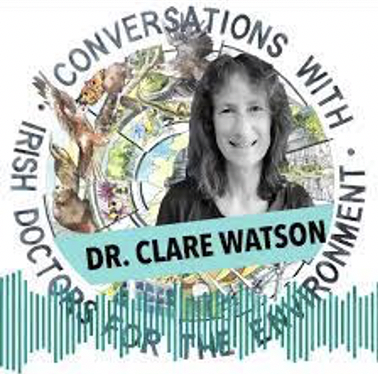
Irish Doctors for the Environment podcast discussion with Clare Watson on the role of psychology in climate action & the need for action-based change. Listen Here.
An Armchair Chat with Dingle Peninsula 2030 SEC
As part of Science Week 2020, SEAI hosted a panel discussion with the various members of Dingle Peninsula 2030 to share the community engagement story, and how a technical pilot project had evolved into broader community action.
Energy & Climate Policy Panel Discussion: Ask the Scientists
As part of the virtual Climate Hack ran during Science Week 2020, MaREI hosted an open panel discussion for students to pose questions to a number of experts from the Energy Policy & Modelling Group.
Re-Imagine Dingle Peninsula
Online workshop that took place over the weekend of 19th – 22nd June. Dingle Creativity & Innovation Hub with support from MaREI worked with the Imagination of Things to bring around 30 people from the area together to work on a range of project ideas for how the region could build back stronger after the pandemic – https://dinglepeninsula2030.com/re-imagine/.
MaREI’s 9th Annual Energy and Climate Policy Research Seminar
Online event on 20th May 2020, during Session 3: Climate action, citizens, communities and infrastructure, Ó Gallachóir B., Watson C., Boyle E., McGookin C., Byrne E. and Mullally G. 2020 ‘Dingle Peninsula 2030 – Diffusion of sustainability’ was presented. Learn more.
Launch of Dingle Peninsula 2030
The official launch of Dingle Peninsula 2030 was held on February 13th, 2020 and attracted over 200 local people. It included the following:
- The launch of the Energy Master Plan, developed by MaREI
- The launch of the ‘Activating the Energy Citizen on the Dingle Peninsula’ outreach programme
- An introduction to the Community Energy Mentors
- Opening of applications for the ESB Networks Electric Vehicle Trial
- Poster presentations by students from Meanscoil Nua an Leith-Triuigh, Coláiste Íde & Pobalscoil Chorca Dhuibhne that were developed as part of the ‘Climate Hack’ run during Science Week 2019.
- An LED bulb swap
- Information from local organisations such as DPTA Sustainable Tourism tips and Bus Eireann Transport options
Evidence-based planning with communities from Corca Dhuibhne
Throughout November 2019 and February 2020, Connor McGookin, Seamus O’Hara and Dr Breandán Ó Caoimh ran a series of community meetings in the parishes across the Dingle Peninsula. The purpose of these meetings was to explore the social, economic and environmental challenges facing each of the parishes within the area in order to develop a plan for a sustainable future. For further information, please see; http://nekd.net/socio-economic-survey-of-the-dingle-peninsula/about/
| November 2019 | February 2020 | ||
| Parish | Date | Parish | Date |
| Lispole | Nov 12th | Annascaul | Jan 30th |
| Camp | Nov 13th | Castlegregory | Feb 3rd |
| Ballyferriter | Nov 14th | Camp | Feb 5th |
| Castlegregory | Nov 18th | Cloghane | Feb 6th |
| Annascaul | Nov 19th | Ballyferriter | Feb 17th |
| Dingle | Nov 26th | Lispole | Feb 18th |
| Keel | Nov 27th | Dingle | Feb 19th |
| Cloghane | Nov 28th | ||
Read the Notes from Community Meetings November 2019 Here
Read the Notes from Community Meetings February 2020 Here
Climate Hack
During SFI Science Week (November 10 -17th) 2019, Connor McGookin and Deirdre de Bhailís, ran a ‘Climate Hack’ in the three secondary schools across the Dingle peninsula. These two-hour sessions involved initially providing the students with some fact sheets on the key challenges facing the area before asking them to develop their own ideas and solutions.
Blindboy Podcast
Prof Jerry Murphy and Clare Watson spoke with Blindboy about the wicked problem of climate change and what we can do to tackle it, with a focus on anaerobic digestion and the importance of community engagement. The interview was released on 6th November 2019, prior to SFI Science Week
You can listen to the podcast here.
Roundtable with Taoiseach, Leo Varadkar
On 11th November 2019, as part of Science Week, Clare Watson spoke about Dingle Peninsula 2030, and the need to support community engagement at a meeting hosted by the Taoiseach, in collaboration with SFI. Clare attended alongside MaREI’s Prof. Brian Ó Gallachóir and Dr. Barry O’Dwyer, and six other climate related scientists.
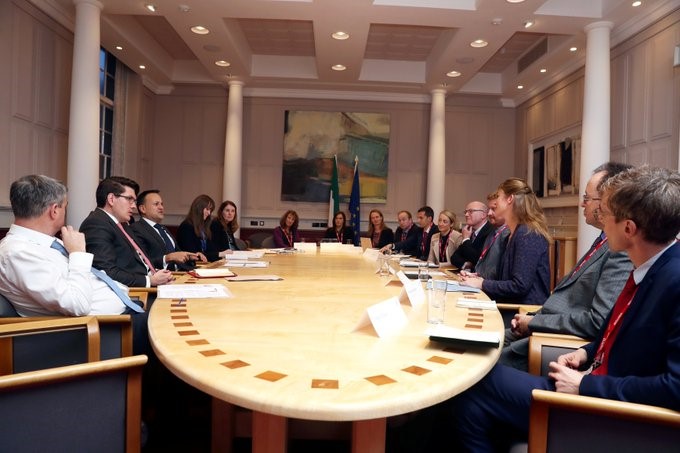
Farmer’s Forum 2019
A second Farmer’s Forum was held during the Dingle Food Festival on Friday, 4th Oct 2019, entitled ‘Farming – the Key to a Sustainable Future’, focusing primarily on bio-digestion. The event also included technology demonstrations.
Speakers were:
- Deirdre de Bhailís, Dingle Hub
- Xavier Dubuisson, Lead consultant on Anaerobic Digestion Feasibility Study
- Áine Macken-Walsh, Senior Research Officer at Teagasc
- Kieran Coffey – inventor of micro-scale digester for the treatment of home food waste mygug.eu
Panelists included:
- Denis Galvin, Lispole ESB Networks Ambassador and IoT Farm Ambassador
- Noel Malone, Gortadoo StoreNet battery project participant
- Richard O’Shea, MaREI Researcher focusing on the use of by-products from the food and drink industry to produce renewable gas.
Presentations to the SFI EPE Meeting
Deirdre de Bhailís, Claire McElligott, Clare Watson, and Evan Boyle presented the work of Dingle Peninsula 2030 to the Education & Public Engagement reps from the 17 SFI-funded Centres in the ERI on 2nd October 2019.
LED bulb swap
The first ‘LED bulb swap’ event was held in April 2019. The overall aim was to begin a discussion on home energy use, by demonstrating how something as simple as changing to LED bulbs can have a significant impact on the amount of electricity used – even small things do add up.
Farmer’s Forum 2018
A Farmer’s Forum was held during the Dingle Food Festival on Friday, 5th Oct 2018, entitled ‘Farming and Energy – A Time of Transition?’. The event focused on the biogas opportunity, and sustainable energy on farms, and included an information fair with key stakeholders and companies involved in the sustainable energy sector
The speakers were:
- Deirdre de Bhailís, Dingle Hub
- Ian O’Flynn, Gas Networks Ireland
- Shane McDonagh, MaREI
- Xavier Dubuisson, XD Consulting & SEAI SEC mentor
- Barry Caslin, Teagasc
- Thomas O’Connor, Manna Organic Farm, and Store
Participatory Mapping
In 2018, Evan Boyle brought a number of organisations in the community together for a mapping workshop. This exercise sought to map out the different goals of the organisations underneath the shared vision of Dingle Peninsula 2030 and to assist in future goal planning. Alongside this, the wider organisational support network and the support types in place to achieve these goals were highlighted. Representatives from the following organisations attended:
- Mol Téic
- NEWKD
- Transition Kerry
- Údarás Na Gaeltachta
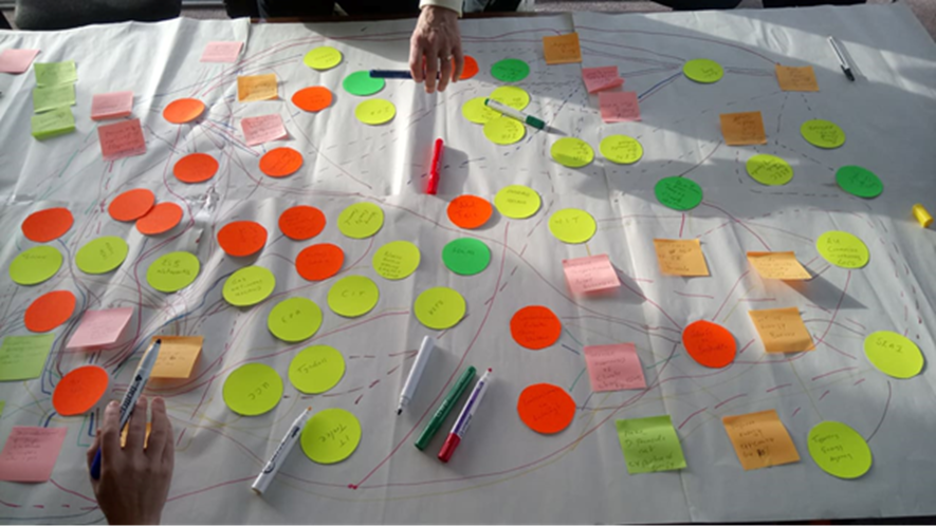
Meeting on Anaerobic Digestion
A meeting was held in the Skellig Hotel in Dingle on 1st August 2018, with six local farmers and other key stakeholders to discuss the potential for an anaerobic digester on the Dingle Peninsula. Prof Jerry Murphy, MaREI gave an opening presentation, which was followed by a group discussion.
Seminar on Dingle Transition Project
Prof. Brian Ó Gallachóir gave a presentation on the work of MaREI at a seminar with key local and national stakeholders, organized by Brendan Tuohy, and held in the Skellig Hotel, Dingle on 4th December 2017. Also in attendance were MaREI’s Gillian Bruton, Aoife Deane, Clare Watson, Connor McGookin and Evan Boyle.
Contact
MaREI Engagement Research Support Officer
Email: ei.ccu@nostaw.eralc
MaREI Education and Public Engagement Support Officer
Email: ei.ccu@enaed.efioa
PhD Researcher, Energy Policy and Modelling Group
Tel; +353 (0)21 4901944
Email: ei.ccu@nikoogcm.ronnoc
PhD Researcher, Energy Policy and Modelling Group
Tel; +353 (0)21 4901944
Email: ei.ccu@elyob.nave
RTE Change Makers
Change Makers is an RTE Six-Part Documentary Series that saw MaREI Director Brian O’Gallachoir return to Kerry to help a community transition to a zero-emissions region in the innovative Dingle Peninsula 2030 project.
Photo Gallery
